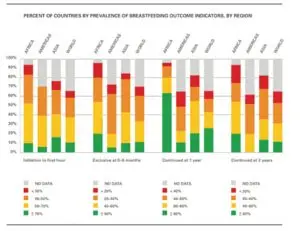China may be a world leader in solar installations, general manufacturing, and overall purchasing power but in another way, too much reliance on modernization is costing it dearly: Not enough mothers are breast feeding anymore.
Just 21% of kids under six months old in the country are being reared exclusively on their mother’s milk, according a recent analysis by Alive & Thrive, a global nonprofit for nutritional health. That’s a problem because not all formulas are good approximates, especially in places with loose label policing. In 2008, 300,000 Chinese babies got sick from tainted formula that contained an unsafe industrial additive called melamine; many developed kidney stones.
On the flip side, breastfeeding might make many children more healthy. Mother’s milk carries antibodies that can battle bacteria and viruses, protecting against issues like diarrhea and pneumonia, either of which can be life threatening for babies. Overall, studies show better outcomes for children who were breastfed longer.
 In China, the related loss in economic potential and health-related expenses are estimated to cost the country $66 billion annually, over a half-percent of the China’s gross national income. It’s the sort of trend that many of other countries are repeating: Globally, the organization says the world is losing about $300 billion annually from women not breastfeeding. About 820,000 children die from complications of being fed differently.
In China, the related loss in economic potential and health-related expenses are estimated to cost the country $66 billion annually, over a half-percent of the China’s gross national income. It’s the sort of trend that many of other countries are repeating: Globally, the organization says the world is losing about $300 billion annually from women not breastfeeding. About 820,000 children die from complications of being fed differently.
To fix that, the Global Breastfeeding Collective, a philanthropic coalition that includes the World Health Organization, UNICEF, and 20 related heath and nutrition nonprofits like 1,000 Days and Alive & Thrive, has launched a $5.7 billion fundraising campaign to get more kids back on the nipple. The goal is to convince potential donors, including foundations, various NGOs, and government making health investments, to boost the current rate of those “exclusively breastfeed”–meaning just that and nothing else–for their first six months from 40% to 50% by 2025 by investing things like public health campaigns and prenatal counseling, and better medical facilities with trained staff to encourage the practice.
“We really need to act now to fully realize the benefits of breast feeding,” says France Begin, a senior advisor with UNICEF’s infant and young child nutrition division. “Prioritizing breast feeding will save lives, save money, and will lead to better health and economic outcomes for generations to come.”
 This all sounds pretty dire but like many health issues the impact from not breastfeeding is unevenly distributed. The hot zone isn’t really America, where parents who choose not to breastfeed often have access nutritional equivalents that have been safety tested, alongside excellent medical facilities to treat illnesses that are often less common anyway because of better sanitation and hygiene practices. It’s developing world and rapidly industrializing spots where a lack of many of these factors creates a cascading threat.
This all sounds pretty dire but like many health issues the impact from not breastfeeding is unevenly distributed. The hot zone isn’t really America, where parents who choose not to breastfeed often have access nutritional equivalents that have been safety tested, alongside excellent medical facilities to treat illnesses that are often less common anyway because of better sanitation and hygiene practices. It’s developing world and rapidly industrializing spots where a lack of many of these factors creates a cascading threat.
When used in tandem with other best breastfeeding practices, like starting suckling within an hour of birth and then staying on mom’s milk for six months, and then continuing once you add other food for about two years, GBC’s proposed target nursing rate would save an estimate 520,000 kids by 2025. By GBC’s estimation, every dollar investment spent on increasing breast feeding rates will generate $35 in future returns across low and middle-income countries, which would see healthier families with increased productivity, ingenuity, and availability to work.
GBC plans to spend that money in several ways, from helping countries introduce legislation and procedures to stop faulty formula ad claims (per an existing International Code of Breast Milk Substitutes) to making sure that health care and maternity centers are more breastfeeding friendly so new moms are encouraged to start (per a set of principles aptly called “Ten Steps of Successful Breastfeeding”).
That’s part of the problem in China, where only 2% of children are born in facilities that provide adequate coaching, counseling, and encouragement to adopt the practice. That percentage is far higher in the United States–at 18%–but our “exclusively breastfeed” rates aren’t much better, at 24% overall. Perhaps that’s related to another factor: In general, U.S. employers score low on the global standard for decently paid maternity leave, which means that mothers who might want to nurse their children for cultural as well as supposed health reasons face difficult logistical issues about how to so if they’re supposed to be back in the office.
The group plans to not only boost available prenatal and post-birth counseling and invest in nationalized awareness campaigns to share health info and re-normalize what used to be a time-honored tradition. In Vietnam, these kinds of promotional tactics led to an 28% increase in exclusive breastfeeding—in recent years. That doesn’t begin to address other GBC recommendations, like decent maternity leave, flexible working hours, and nursing friendly offices, which employers should do in tandem to make this work.
GBC also wants to set aside funds to track, monitor and evaluate every place that promotes more breastfeeding, so that it will have more results (good, or bad) that can stand up to scientific scrutiny the next time they call for more reinvestment. That might put to rest controversies about cause versus correlation. Like, is the true benefit of drinking breast milk in the developing world because your kid gets to totally avoid the alternative mix of powder and unsanitary water.
“There are millions of women out there who want to breastfeed but they don’t have the support they need,” say Begin. “We have 820,000 children die annually and millions more are susceptible to avoidable illnesses and learning difficulties later in life. So really the current lack of investment in breastfeeding is that is a missed opportunity for all nations to improve the health and economic outcomes of scale.”
Recognize your brand’s excellence by applying to this year’s Brands That Matter Awards before the early-rate deadline, May 3.
